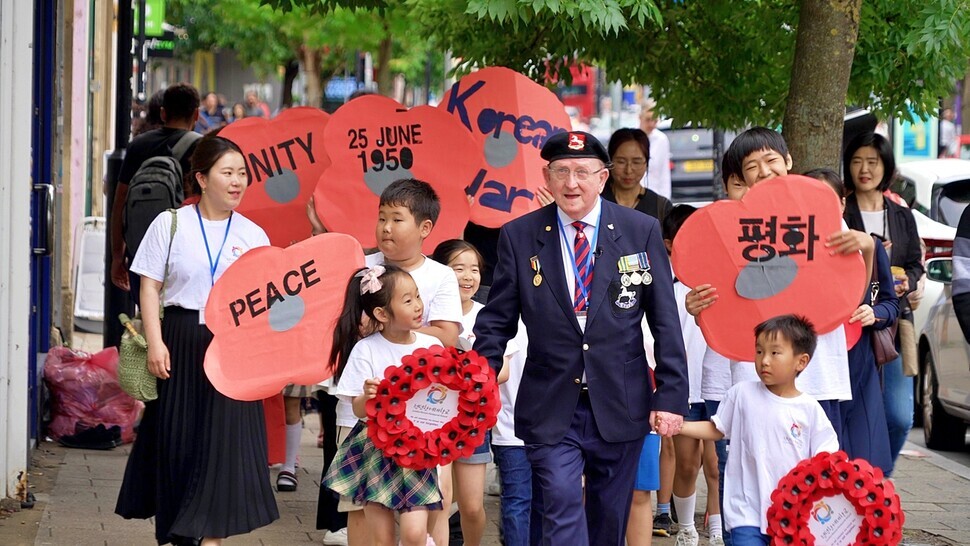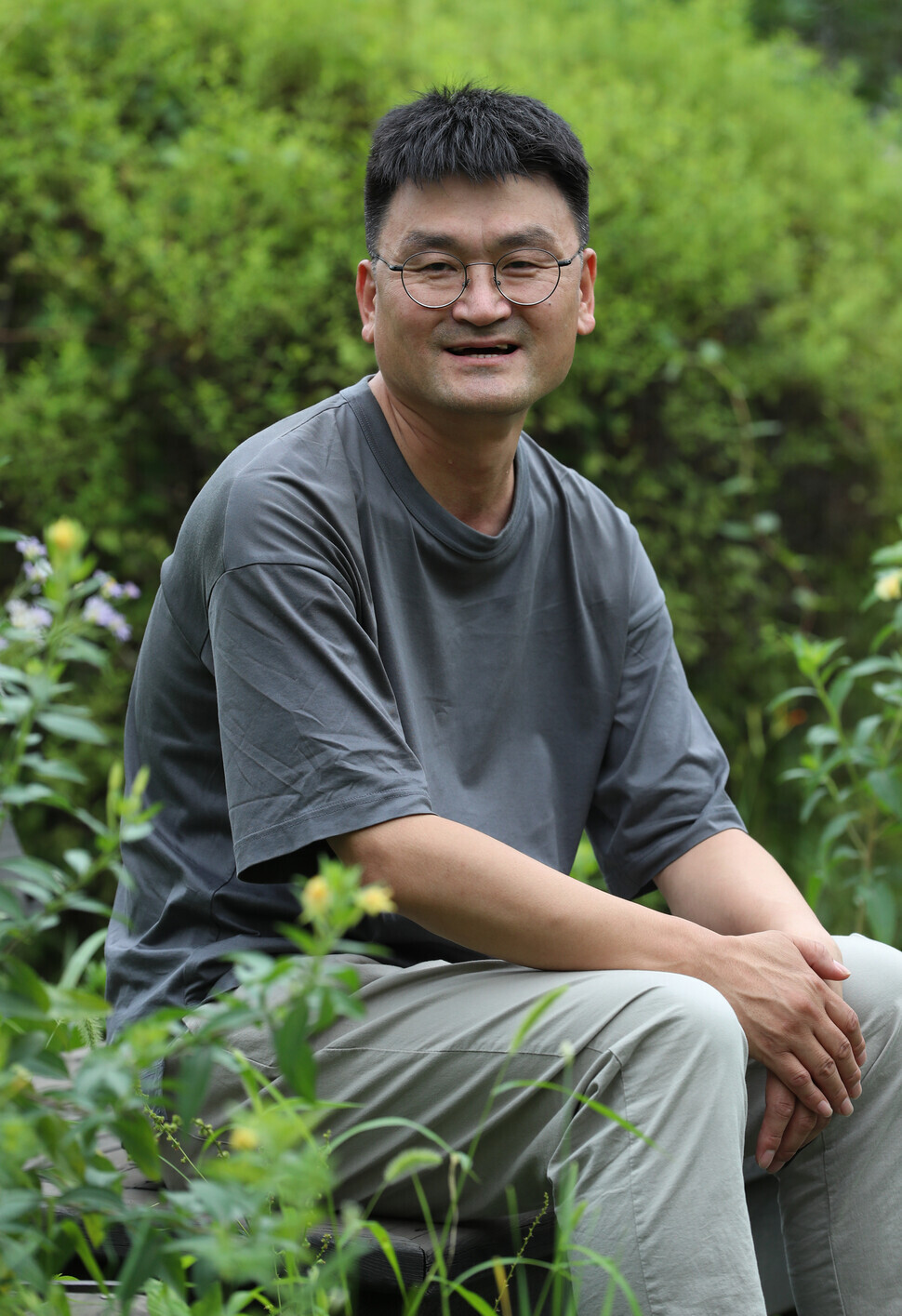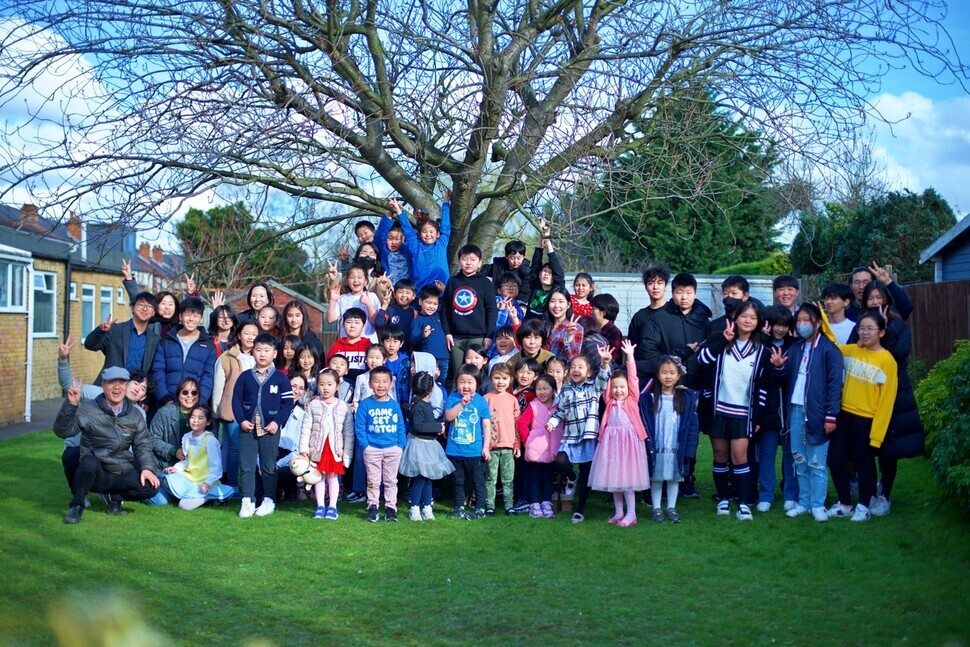hankyoreh
Links to other country sites 다른 나라 사이트 링크
London Korean school offers glimpse of a unified Korea

New Malden, a neighborhood on the outskirts of London, is known as “Little Korea.” Some 20,000 Koreans live in the area, including 800-1,000 people who have defected from North Korea.
In the late 2000s, the UK granted asylum status to a large number of defectors on humanitarian grounds. There are also quite a few who first settled in Korea before moving to the UK.
Jang Jeong-hoon, a director who lives in London, has focused his work on the North Korean defectors living in New Malden.
“It occurred to me that this is the first generation of North Korean defectors who have left the Korean Peninsula and settled as a group in Europe. I thought it would be worth making a record of them,” Jang said during an interview at the Hankyoreh office in Seoul’s Mapo District on Aug. 10.
Jang worked briefly as a newspaper reporter in the early 1990s before going to England to study in 1996. He studied documentary filmmaking in school, eventually completing a master’s degree. He was taking commissions as a freelance video producer in London in 2015 when he made up his mind to exclusively make videos about refugees.
As he cultivated his interest in the lives of North Korean defectors, he learned that a Korean language school was being set up for children in the area.
“I figured that a documentary about North Korea would be depressing, angering and focused on the past, but a story about the school and children would be upbeat, enjoyable and focused on the future,” he said.
The London Korean Hankyoreh School opened on Jan. 23, 2016. The leading figure in its establishment was Choi Sung-cheol, who defected in 2002. Out of a belief in the school’s mission, Seoul native Park Jong-min provided part of the funding and agreed to chair the board of directors.
The school was hosted in space borrowed from a nearby church, and the classes were taught on a volunteer basis by parents and students from Korea. Tuition was free. When the school fell short of operating expenses, the parents would sell used goods at flea markets to raise funds.

Jang has been busily keeping a record since the school was still in its preparatory phase.
“Defectors are camera-shy because they’re afraid something bad might happen to family members back in North Korea. They’re also suspicious because they had to live in hiding,” Jang observed.
“The only way I could earn their trust was to always be there for them, sharing meals and drinks. After a few years of that, they came to trust me.”
While Jang thought the filming would be done in two years, it ended up taking more than six. “All the teachers and parents have rotated out, making me the person who’s been here the longest. I guess they all think of me as family now.”
Jang said that watching children playing together has given him insight into inter-Korean relations.
“When someone comes over and hits one of the kids, the other kids stand up [to the bully] and comfort the friend who got hit. Why can’t North and South Korea be like that?”
“When the kids were playing in the water, one of them climbed up a slippery part with a branch and then handed the branch down so another kid could climb up. That got me wondering why South Korea can’t ‘hand a branch’ to the North now that it’s achieved economic development.”
North Korean defectors in the area are having their children learn the Korean language so that they don’t lose their identity. The documentary features a scene in which Choi Sung-cheol lectures his two sons, who are fluent in English but speak Korean poorly.
That was something Jang can relate to, considering he’s also raising two sons born in England. “I also want my kids to be good at Korean and maintain their Korean identity here in the UK,” he said.
Early this year, Jang held a screening at the school for the completed version of the first part of his documentary “Chronicling London Korean Hankyoreh School.”
Parents told Jang that they now realize what he’d been trying to say and that they wished they’d been more cooperative with his filming.
“That just blew me away. Realizing they’d fully accepted me and understood my heart made it all worthwhile. Even if my documentary never makes it to the wider world, I think I’ll be happy just to have provided some comfort and left a record for posterity,” Jang said.

Early in July, Jang came to Korea with his wife and two sons. He wanted to show his children what Korea was like. While in the country, he also held five community screenings of his documentary. His hope was that someone might decide to donate to the school after watching the documentary.
“When British people get together to study Korean, the Korean Embassy gives them recognition and support, but the London Korean Hankyoreh School still doesn’t have any government support. Every little bit we get from our Korean sponsors helps.”
Jang returned to the UK on Aug. 16. His goal is to wrap up more work on his documentary and reach a wider audience at film festivals next year.
“The London Korean Hankyoreh School has a mixture of children and teachers from both South and North Korea. The school is basically a unified Korea.”
“If my documentary leaves viewers with the hopeful impression that our nation could be reunified so naturally, that’s all I could ask for.”
By Suh Jung-min, staff reporter
Please direct questions or comments to [english@hani.co.kr]

Editorial・opinion
![[Column] Park Geun-hye déjà vu in Yoon Suk-yeol [Column] Park Geun-hye déjà vu in Yoon Suk-yeol](https://flexible.img.hani.co.kr/flexible/normal/500/300/imgdb/original/2024/0424/651713945113788.jpg) [Column] Park Geun-hye déjà vu in Yoon Suk-yeol
[Column] Park Geun-hye déjà vu in Yoon Suk-yeol![[Editorial] New weight of N. Korea’s nuclear threats makes dialogue all the more urgent [Editorial] New weight of N. Korea’s nuclear threats makes dialogue all the more urgent](https://flexible.img.hani.co.kr/flexible/normal/500/300/imgdb/original/2024/0424/7317139454662664.jpg) [Editorial] New weight of N. Korea’s nuclear threats makes dialogue all the more urgent
[Editorial] New weight of N. Korea’s nuclear threats makes dialogue all the more urgent- [Guest essay] The real reason Korea’s new right wants to dub Rhee a founding father
- [Column] ‘Choson’: Is it time we start referring to N. Korea in its own terms?
- [Editorial] Japan’s rewriting of history with Korea has gone too far
- [Column] The president’s questionable capacity for dialogue
- [Column] Are chaebol firms just pizza pies for families to divvy up as they please?
- [Column] Has Korea, too, crossed the Rubicon on China?
- [Correspondent’s column] In Japan’s alliance with US, echoes of its past alliances with UK
- [Editorial] Does Yoon think the Korean public is wrong?
Most viewed articles
- 1[Column] Park Geun-hye déjà vu in Yoon Suk-yeol
- 2Will NewJeans end up collateral damage in internal feud at K-pop juggernaut Hybe?
- 3Thursday to mark start of resignations by senior doctors amid standoff with government
- 4Why Korea shouldn’t welcome Japan’s newly beefed up defense cooperation with US
- 5‘We must say no’: Seoul defense chief on Korean, USFK involvement in hypothetical Taiwan crisis
- 6[Guest essay] The real reason Korea’s new right wants to dub Rhee a founding father
- 7N. Korean hackers breached 10 defense contractors in South for months, police say
- 8[Column] ‘Choson’: Is it time we start referring to N. Korea in its own terms?
- 9[Editorial] New weight of N. Korea’s nuclear threats makes dialogue all the more urgent
- 10Kim Jong-un expressed ‘satisfaction’ with nuclear counterstrike drill directed at South